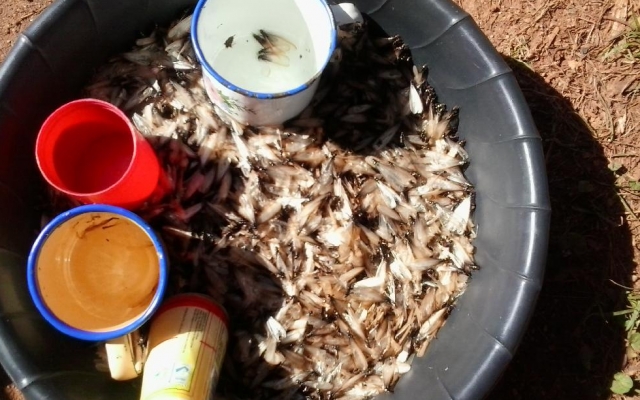 Insects like termites and mayflies could become a delicacy in Kenyan homes and address environmental degradation, with local scientists promoting their benefits as a simple, environmentally friendly solution to the fragile food security situation now affecting over four million in Kenya where the insects are readily available.
Insects like termites and mayflies could become a delicacy in Kenyan homes and address environmental degradation, with local scientists promoting their benefits as a simple, environmentally friendly solution to the fragile food security situation now affecting over four million in Kenya where the insects are readily available.
Prof Monica Ayieko, a scientist and lecturer at Maseno University, has conducted a survey on how farmers can easily trap the insects, preserve them and turn them into a delicacy, arguing that such insects are favoured by the very weather conditions brought about by climate change. The insects, the Professor argues, should be adopted by farmers keen on protecting the environment because they emit less harmful gases than livestock adopted by farmers.
Insects' role as a food source has also been recognized by scientists at Wageningen University in Netherlands who found that farming them on a large scale for food would cause far less damage to the environment than equivalent livestock production.
The scientists compared emissions created by producing livestock for food and by producing insects. In particular, they focused on the greenhouse gases methane and nitrous oxide, which have a greater warming effect than carbon dioxide. They also measured ammonia production, which harms the environment by acidifying soil and water.
They reared mealworms, locusts and crickets, all of which are consumed around the world, as well as sun beetles and cockroaches, which people do not eat, despite their potential as a protein source, while monitoring the amount of gas produced per kilogram of insect growth. Compared to cattle, weight for weight, insects emitted 80 times less methane, a gas with 25 times more impact on global temperature levels than carbon dioxide, while crickets produced 8-12 times less ammonia than pigs.
These insects are also readily available, even in arid areas where people often experience drought, and are rich in essential nutrients, such as protein, fatty acids, vitamins, calcium, iron and potassium according to Prof Ayieko. There are over 500 edible insects in Africa, with nutrition studies showing that eating 100 grams each day provides enough nutrients to maintain good health, with mayflies and termites, for example, assisting lactating mothers produce milk. Even though insects have been used as food in many Kenyan societies, the major challenge will be to popularise them, according to Professor Ayieko.
Wanton deforestation of Kenyan forests,with only about 2 percent of Kenyan land being forested, and pressure on water resources due to agricultural chemicals, effluent urban and industrial wastes and use for hydroelectic power have put a strain on Kenya's ecosystem and environment. Deforestation for example has led to change in weather patterns, which has had an ultimate effect of delayed planting and harvesting and dismal food production. Kenya currrently has over 4million food insecure people up from just 1 million five years ago according to the Ministry of Agriculture.
Kenyan farmers who have been buffeted by the vagaries of weather, with change in planting and harvesting seasons now taking a toll on the food they place on the table, are yet to come to terms with having insects as a delicacy. “I am surrounded by termites from my livestock’s sheds to my farm. I have heard from the radio scientists discussing that they could be the solution to the food shortage we face including the low yields. But i still haven’t understood how anyone can bring themselves to place them in their mouth, chew and swallow them,” said Hannah Wanjohi a peasant farmer from Central Kenya who, like many of her fellow farmers, now only stare at bare lands, at a time when traditionally they would be enjoying a bumper harvest.
Scientists fully aware that marketing the insects is a tough sell have come up with creative ways . Prof Ayieko for example has already made dough and butter from the insects, a method she has patented and which has gained popularity in the US. "We managed to change the way insects look on the table during the project. Besides pastries, we can also make samosas and sausages out of them," she said.
Her idea has already interested the Research Project for Sustainable Development which has funded her research to a tune of $20,000. The Kenya Bureau of Standards is also investigating samples of her muffins, crackers, sausages and meatloaf to see if they could eventually be sold in supermarkets. She, however, warns that not all insects are edible and thus selectivity is important in order to identify and protect the edible ones from major hazards like the use of broad-spectrum insecticides in farms.
The discovery of insects as excellent food sources that contain nutrients more traditionally found in food sources such as beef comes alongside a report recently released by a Food and Agriculture Organization (FAO) researcher that predicted that by 2050 it will have become far more expensive to buy beef, as "the necessary resources for the production of beef will be three, four, five times higher than those of chicken and pork," making the meat a preserve of the rich.
Critics however argue that raising insects on a large scale could invite disaster since “rearing such insects in their millions would be hard to control and in the event that the insects disappear into nature, the entire world would face hunger," said Dr Philip Ndonga, an entomologist.
















Comments powered by CComment